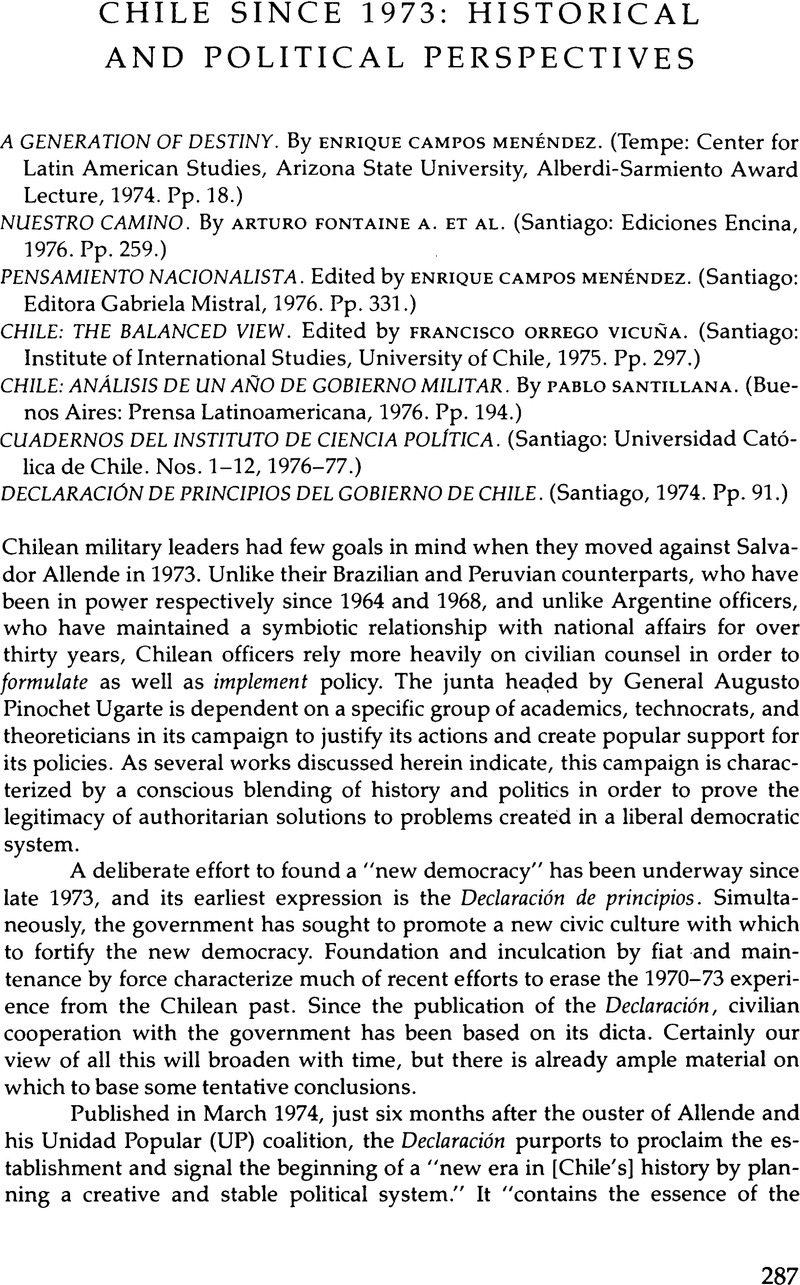No CrossRef data available.
Article contents
Chile Since 1973: Historical and Political Perspectives
Review products
Published online by Cambridge University Press: 24 October 2022
Abstract

- Type
- Books in Review
- Information
- Copyright
- Copyright © 1979 by the University of Texas Press
References
Notes
1. All citations from the Declaración are from pp. 25–40 (pp. 1–19, Spanish text). See the recent article by Leonard Krieger, “The Idea of Authority in the West,” American Historical Review 82, no. 2 (Apr. 1977): 249–70, wherein Krieger notes Benito Mussolini's interpretation of the compatibility of authority and liberty (p. 255). Much of the Declaración is couched in similar terms. So are all declarations, manifestos, plans, and such issued by military leaders during critical times in Chile since World War I.
2. Palacios' “Decadencia del espíritu de nacionalidad” was written in 1908. Encina's “Causas de la decadencia del sentimento de la nacionalidad” is from Nuestra inferioridad económica. Prat's “Pensamiento nacionalista” consists of selections from the pages of Estanquero, the neofascist weekly that appeared between 1949 and 1954. It is no coincidence that the support group of Diego Portales was also called Los Estanqueros.
3. This is not far removed from the justifications for state involvement in the definition of what the long-range course and content of politics should be, as discussed in Carl Schmitt, The Concept of the Political (New Brunswick, 1976), originally published in monograph form as Der Begriff des Politischen (Munich, 1932).
4. Instituto de Estudios Generales, Fuerzas armadas y seguridad nacional (Santiago, 1973).
5. Recent literature is reviewed in Arturo Valenzuela and J. Samuel Valenzuela, “Visions of Chile,” LARR 10, no. 3 (Fall 1975): 155–75; and Paul E. Sigmund, “U.S. Policy Towards Chile,” LARR 11, no. 3 (Fall 1976): 121–27.
6. El Mercurio staffers who denounced Allende's anti-free-press inclinations have less to say concerning the Pinochet government's restrictive policy towards media freedoms. On freedom of speech in Allende's Chile see El Mercurio associate editor Tomás P. MacHale, El frente de la libertad de expresión, 1970–1972 (Santiago, 1972).
7. Comparable recent studies of the 1970–73 years from the left are Stefan de Vylder, Allende's Chile: The Political Economy of the Rise and Fall of the Unidad Popular (Cambridge and New York, 1976); and Ian Roxborough, Phil O'Brien and Jackie Roddick, Chile: The State and Revolution (New York, 1977).
8. The reviewer's own “El profesionalismo militar chileno en el siglo XX: pensamiento y autopercepción de la clase de oficiales” became no. 3 in this series. Apparently the theme of the paper, that army officers have been historically hostile towards liberal democracy, Marxism, and party politics, justified its inclusion in Cuadernos. The following is a list of the rest of the titles, as of January 1977:Álvaro Alsogaray, “La democracia de masas y la crisis en países del mundo libre,” 4 (May 1976); Gustavo Cuevas Farren, “Cuando la rebelión es un derecho: el caso de Chile durante la U.P.,” 5 (June 1976); José Luis Cea Egaña, “Teoría de la libertad de opinión,” 6 (July 1976); Carlos Naudón de la Sota, “La proliferación nuclear: ensayo sobre la diseminación de la muerte,” 7 (Aug. 1976); José Luis Cea Egaña, “La representación funcional en la historia constitucional de Chile,” 9 (Oct. 1976); Alejandro Silva Bascuñán, “En torno al porvenir político de Chile,” 10 (Nov. 1976); Julio von Muhlenbrock, “La concepción de una nueva democracia para Chile,” 11 (Dec. 1976); and Pablo Rodríguez Grez,“ ¿Democracia liberal o democracia orgánica?,” 12 (Jan. 1977).
9. “We are still ‘in focus’ so far as the French Revolution is concerned, but so we should have been in relation to the Fronde had we lived earlier.” See Claude Lévi-Strauss, The Savage Mind (Chicago, 1969), esp. chap. 9, “History and Dialectic,” pp. 245–69.
10. Krieger, “The Idea of Authority,” esp. pp. 249–57.
11. See H. Stuart Hughes, History as Art and as Science (New York, 1964), chap. 5, “Is Contemporary History Really History?,” pp. 89–107.
12. Cited material is from p. 16; reviewer's emphasis.


